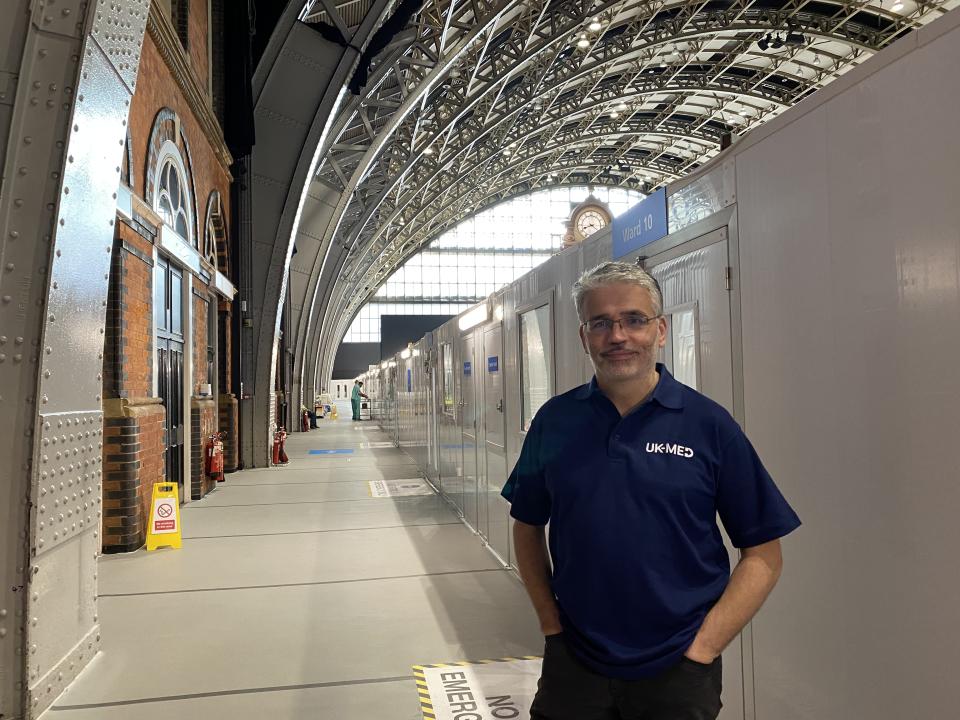UK medic tells of devastation as he delivers aid in Ukraine
A Scottish nurse working in Ukraine has told of his shock after seeing evidence that a Russian tank bombarded a hospital.
David Anderson saw the burnt-out wreckage of the tank with its gun still pointing directly at the hospital in Trostianets, eastern Ukraine, which it had been attacking.
Mr Anderson, a volunteer with frontline aid charity UK-Med, said he has been shocked by the scale of devastation and injuries in Ukraine, where he has encountered people with traumatic amputations, flesh burns and blast injuries.
There have been more than 130 attacks on healthcare facilities since Russian President Vladimir Putin launched his invasion, while more than 100 fire stations and 250 fire engines have been destroyed.

The Montrose-born medic was shown the devastation inside the hospital, which is now unusable.
He said: “I find it unbelievable and depressing that a hospital would be deliberately attacked.
“The tank is being guarded as evidence of a war crime and I could not believe what I was seeing. It had been blown up in the end and its gun turret is still pointing at the hospital it was attacking.
“I was shown round the wards and there was just devastation everywhere where the tank shells had hit. It’s rendered a 170-bed hospital completely inoperable.”
UK-Med has just received £600,000 from the UK Government to provide humanitarian support to Ukraine.
Mr Anderson, who has been in Ukraine since March 14, has worked on humanitarian missions in crisis-hit countries including South Sudan and Myanmar, and was in Beirut in the aftermath of the explosion at the port in 2020.
However, he has been shocked by the extent of what he has encountered in Ukraine.
He said: “I’ve been in a couple of war zones before – but not on this scale.
“I don’t think you ever get used to going into conflict zones. I’m reasonably comfortable with seeing limb injuries having worked in South Sudan and other places, but oh my God, the scale of this.
“We walked into one hospital, and they said there were 200 people, but it felt like more. There were people with traumatic amputations, flesh burns, blast injuries, just horrific injuries. It’s the volume that is genuinely astounding.”
He added: “You are used to humanitarian deployments to conflict zones in Africa, but I never, ever expected to be doing this work in Europe. That doesn’t mean the suffering of people in Tigray is any less, it’s just this situation is unfathomable.
Wondering how you can help provide emergency healthcare in Ukraine and neighbouring countries?👉 Please support our appeal at https://t.co/xYkO9FLCwn👉 Get your workplace, community groups and schools involved with fundraisers👉 Share with your friends and family
— UK-Med (@UKMed) March 7, 2022
“The spectre of war in Europe has not been something we’ve really had to consider in our lifetime. People are going on stag or hen weekends to Bucharest or Warsaw or booking holidays to the Balkans or Turkey and just a couple of hundred miles away you have this terrible thing unfolding.”
As UK-Med’s Humanitarian Health adviser, Mr Anderson is playing a crucial role helping to deliver UK aid on the ground.
UK-Med, is receiving funding – worth up to £300,000 – from the Foreign, Commonwealth and Development Office (FCDO) to help train Ukrainian doctors, nurses and paramedics on how to deal with mass casualties.
They have also set up mobile health clinics that are supporting the most vulnerable civilians remaining in Ukraine, including the elderly and young children.
The UK is donating a further £300,000 worth of medicines and pharmaceutical supplies to UK-Med – enough to support a hospital for up to six weeks.
UK Foreign Secretary Liz Truss said: “The Kremlin continues to lie about deliberate attacks on Ukraine’s hospitals and the indiscriminate targeting of civilians.
“Now our vital humanitarian support will help save lives and deliver medical expertise to the frontline.”

 Yahoo Movies
Yahoo Movies 